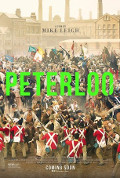
Directed by
Mike Leigh
155 minutes
Rated M
Reviewed by
Bernard Hemingway

Peterloo
Synopsis: An account of the "Peterloo Massacre” that occurred in the immediate aftermath of the Napoleonic wars and in the shadow of the French Revolution.As a filmic history lesson writer-director Mike Leigh’s thoroughgoing recreation of the infamous massacre of the innocents on St. Peter's Field in Manchester, England on August 16, 1819 is unequivocally commendable. That as a dramatic entertainment it is less successful is more than a little surprising and slightly disappointing, particularly given the director’s outstanding career as a film-maker.
Much of the problem lies with Leigh’s script which not only relies heavily on lengthy speechifying, much of it in the prolix style of the day, but reiterates itself as it sketches in the conflicting forces which constitute the catalyst for the massacre - on the one hand the brutally repressive ruling class, whether they be the aristocracy or the bourgeoisie, on the on other, the disenfranchised "labouring” class - which takes place against a background of near famine and rising unemployment and a consequently growing political radicalism. Although it is easy enough to understand Leigh’s sympathies, the result is a simple typology of good and evil duly laid out in scenes which although wonderfully well-staged unnecessarily repeat themselves. There are in fact few scenes which are not more or less duplicated.
Leigh fleshes out the political and ideological conflict with a few dramatic focal points. On one side is the desperately poor family of a young shell-shocked soldier (David Moorst) who survived Waterloo and a group of journalist activists on the local newspaper whose decision to import a celebrity radical orator (Rory Kinnear) from London to address a gathering in St Peter’s Field will end in the massacre. On \ the other is the Home Secretary (Karl Johnson) whose job it is to stamp out sedition and a gaggle of more less vicious local magistrates (it is, from an Antipodean perspective a little ironic that deportation to Botany Bay was considered a punishment back then) and their bully boys with the effete Prince Regent (Tim McInnerny) as a symbol of the decayed aristocracy. All these characters, however, remain more or less caricaturally defined by the good/evil opposition and at no stage does the film offer much in the way of emotional engagement.
Whilst it seems odd that Leigh has so favoured historical illustration over dramaturgical development there is no denying that as such Peterloo is wonderfully well-made. With outstanding contributions in the departments of production design, art direction and especially costume design as well as from Leigh's long-time cinematographer Dick Pope and by making judicious use of CGI Leigh has given us a superb recreation of a time, a place and a tragedy long forgotten.

Want more about this film?


Want something different?




